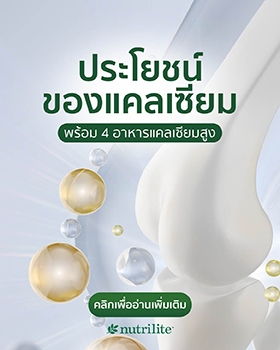การรับประทานอาหารเช้าควรถือเป็นกิจวัตรประจำวันของทุกคนที่ไม่ว่าจะเร่งรีบแค่ไหนก็ไม่ควรงด เพราะจะทำให้ประสิทธิภาพการคิดและการเรียนรู้ลดลง เพิ่มความเสี่ยงในการเป็นโรคเรื้อรังต่างๆ เช่น โรคอ้วน โรคเบาหวานชนิดที่ 2 โรคหัวใจและหลอดเลือด โรคกรดไหลย้อน โรคนิ่วในถุงน้ำดี เป็นต้น
อาหารเช้าที่ดีควรคำนึงถึงคุณภาพที่ให้สารอาหารครบถ้วนและเพียงพอสำหรับมื้อแรกของวัน โดยควรประกอบด้วยโปรตีนสูง คาร์โบไฮเดรตเชิงซ้อน ไขมันที่ดีโอเมก้า-3 วิตามิน เกลือแร่ และไฟโตนิวเทรียนท์ อย่างไรก็ตาม บางคนที่ไม่มีเวลาเตรียมมื้อเช้าจริงๆ อาจหาตัวช่วยที่ง่าย สะดวก รวดเร็ว และคุณภาพครบถ้วน เช่น ผลิตภัณฑ์ทดแทนมื้ออาหาร หรืออาหารเสริมสูตรครบถ้วน สำหรับเสริมอาหารจากมื้อปกติ ที่เป็นการนำอาหารหลัก 5 หมู่ มาอยู่ในรูปแบบผง โดยอาจกินคู่กับโปรตีนผงชงในมื้อเช้าร่วมด้วย เพื่อเพิ่มโปรตีนให้กับอาหารเช้ามื้อหลัก
ข้อเสียของการไม่กินอาหารเช้า...อาการและโรคที่ตามมา
โรคอ้วน
อาหารเช้าเป็นมื้ออาหารที่แตกต่างจากอาหารมื้ออื่น เพราะเป็นมื้อที่ร่างกายผ่านการอดอาหารมานานเกือบ 12 ชั่วโมง ทำให้ระดับฮอร์โมนเกรลินสูง (ฮอร์โมนแห่งความหิว) และระดับฮอร์โมนอินซูลินต่ำ หากไม่กินอาหารเช้า ก็จะยิ่งทำให้ระดับน้ำตาลในเลือดต่ำลง ส่งผลให้เพิ่มความอยากอาหารในมื้อถัดไป จนไปเพิ่มแนวโน้มการกินอาหารที่มีพลังงานและไขมันสูงในมื้อเที่ยงมากเกินไป เป็นสาเหตุให้มีน้ำหนักเกินและเกิดโรคอ้วนตามมาได้อย่างไม่รู้ตัว นอกจากนี้ การงดมื้อเช้าเป็นประจำจะทำให้ร่างกายได้รับโปรตีนไม่เพียงพอ เมื่อเกิดสะสมไปนานวัน มวลกล้ามเนื้อก็จะลดลง ส่งผลให้อัตราการเผาผลาญพื้นฐานลดลงไปด้วย ทำให้อ้วนง่ายยิ่งขึ้น
โรคเบาหวานชนิดที่ 2
เพราะการงดอาหารมื้อเช้าส่งผลให้ความไวของอินซูลินลดลง เกิดภาวะดื้อต่ออินซูลินตามมา ทำให้ร่างกายไม่สามารถนำน้ำตาลที่อยู่ในกระแสเลือดเข้าเซลล์ได้ดีเท่าที่ควร จึงเสี่ยงต่อการเป็นโรคเบาหวาน อาหารมื้อเช้าจะช่วยให้ความไวของอินซูลินสูงขึ้น ส่งผลให้การตอบสนองของน้ำตาลในเลือดหลังมื้อเช้าดีขึ้น โดยเฉพาะถ้ากินอาหารที่มีใยอาหารสูง เช่น โฮลเกรน ผลไม้ การกินอาหารเช้าเป็นประจำจะช่วยลดภาวะดื้อต่ออินซูลินที่เป็นสาเหตุของโรคเบาหวานได้ถึงร้อยละ 35-50
โรคหัวใจและหลอดเลือด และโรคหลอดเลือดสมอง
มีงานวิจัยระดับนานาชาติที่ศึกษาพบว่าคนไม่กินอาหารมื้อเช้าเสี่ยงที่จะเป็นโรคหัวใจและหลอดเลือดเพิ่มขึ้นเมื่อเทียบกับคนที่กินมื้อเช้าเป็นประจำ โดยเฉพาะโรคหลอดเลือดสมองนั้น พบว่าการกินอาหารเช้าทุกวัน ช่วยป้องกันโรคหลอดเลือดสมองแตกได้ เนื่องจากการไม่กินอาหารเช้า ส่งผลให้แกนทำงานของสมองส่วนไฮโปทาลามัส ต่อมใต้สมอง และต่อมหมวกไต ทำงานมากเกินไป จึงส่งผลให้ความดันโลหิตสูงช่วงเช้า ซึ่งเป็นปัจจัยเสี่ยงที่สำคัญของโรคหลอดเลือดสมองแตก
ประสิทธิภาพการเรียนรู้และความจำลดลง
อาหารเช้ามีประโยชน์ต่อความจำ ช่วยให้งานที่ต้องการใช้สมาธิเกิดข้อผิดพลาดลดลง ผู้ที่กินอาหารเช้าที่มีดัชนีน้ำตาลต่ำ จะมีความสามารถในการจำดีขึ้น เนื่องจากอาหารเช้ากลุ่มนี้จะประกอบด้วยคาร์โบไฮเดรตเชิงซ้อนที่ไม่ผ่านการขัดสี อุดมด้วยใยอาหาร เมื่อถูกย่อยในระบบทางเดินอาหาร น้ำตาลกลูโคสจะถูกปล่อยเข้าไปในกระแสเลือดอย่างช้าๆ ระดับน้ำตาลในเลือดก็จะค่อยๆ เพิ่มขึ้นอย่างคงที่ ทำให้สมองได้รับกลูโคสเพียงพอ นอกจากนี้การเสริมน้ำมันปลา (Fish Oil) ที่มีกรดไขมันโอเมก้า-3 จะช่วยชะลอความเสื่อมของสมองได้โดย EPA ที่พบในน้ำมันปลาจะช่วยต้านการอักเสบ และ DHA ช่วยลดการอักเสบของเซลล์ประสาท และยับยั้งการตายของเซลล์ประสาทที่เกิดจากอนุมูลอิสระ
โรคกรดไหลย้อน
เกิดจากพฤติกรรมการกินอาหารที่ไม่เหมาะสม 4 อย่าง
- กินอาหาร 2-3 ชั่วโมงก่อนเข้านอน
- กินของหวานช่วงค่ำ
- กินอาหารเร็ว
- ไม่กินอาหารมื้อเช้า หรือดื่มเครื่องดื่มคาเฟอีนอย่าง กาแฟ ชา เครื่องดื่มชูกำลัง แทนอาหารมื้อเช้าซึ่งเครื่องดื่มเหล่านี้จะยิ่งเป็นตัวกระตุ้นให้น้ำย่อยหลั่งออกมามากขึ้น ยิ่งทำให้อาการกรดไหลย้อนเป็นมากขึ้น
โรคนิ่วในถุงน้ำดี
หากไม่กินอาหารมื้อเช้าติดต่อกันเป็นประจำ จะส่งผลให้น้ำดีไหลเวียนออกจากตับได้ไม่ดี ส่งผลให้ถุงน้ำดีขุ่น ในที่สุดทำให้เกิดก้อนนิ่วชนิดโคเลสเตอรอล
มื้ออาหารเช้าที่ดีควรเป็นอย่างไร
อาหารเช้าสำคัญเพราะเป็นมื้ออาหารหลัก และมื้ออาหารเช้าที่ดีควรมีแคลอรีสูงเฉลี่ย 20-35% ของพลังงานที่ร่างกายต้องการต่อวัน ให้คุณค่าทางโภชนาการครบทั้ง 5 หมู่ และหลากหลาย มีสารอาหารครบทั้ง 3 กลุ่ม ได้แก่
แมคโครนิวเทรียนท์ (Macronutrients) ประกอบด้วย
โปรตีน: ปริมาณโปรตีนที่เหมาะสมคือ 1 กรัม/น้ำหนักตัว (kg)/วัน ในผู้ใหญ่สูงอายุ แนะนำให้กินโปรตีน 1.0-1.2 กรัม/น้ำหนักตัว (kg)/วัน เพื่อชดเชยความสามารถในการสร้างมวลกล้ามเนื้อที่ลดลงเมื่ออายุมากขึ้น โปรตีนที่ดีต้องมีไขมันต่ำ เช่น ไข่ขาว เนื้อปลา อกไก่ หรือเป็นโปรตีนทางเลือกจากพืชที่ดีที่ย่อยง่าย เช่น โปรตีนจากถั่วเหลืองซึ่งมีสารไฮโซฟลาโวน ช่วยลดระดับไขมันเลว (LDL-C) และเพิ่มระดับไขมันดี (HDL-C) ในเลือด
คาร์โบไฮเดรต: พยายามเลือกกินคาร์โบไฮเดรตเชิงซ้อนหรือคาร์โบไฮเดรตที่ไม่ผ่านการขัดสี เพราะประกอบด้วยใยอาหาร เช่น ขนมปังโฮลเกรน ข้าวกล้อง เป็นต้น
ไขมัน: เลือกกินไขมันที่ดีต่อสุขภาพ ได้แก่ กรดไขมันโอเมก้า-3 เพราะช่วยลดการอักเสบ ช่วยลดน้ำหนัก ช่วยเพิ่มภูมิคุ้มกัน ดีต่อฮอร์โมนเพศ ผิวพรรณ เส้นผม และสมอง กรดไขมันโอเมก้า-3 พบมากในเนื้อปลา เมล็ดแฟล็กซ์ เมล็ดเจีย และถั่ววอลนัท
ไมโครนิวเทรียนท์ (Micronutrients)
ประกอบด้วย วิตามินและเกลือแร่ แม้ร่างกายจะต้องการในปริมาณน้อย แต่ก็ขาดไม่ได้ เพื่อใช้ในการควบคุมปฏิกิริยาเคมีของร่างกาย เพื่อทำให้เซลล์ต่างๆเติบโตและทำหน้าที่ได้เป็นปกติ และมีความสำคัญต่อการทำงานของระบบเอนไซม์ในเมแทบอลิซึม ช่วยการทำงานของเซลล์ เป็นส่วนประกอบของเนื้อเยื่อและสารในร่างกาย
ไฟโตนิวเทรียนท์ (Phytonutrients)
หมายถึง สารเคมีที่มีฤทธิ์ทางชีวภาพที่พบเฉพาะในพืชผักผลไม้ สารกลุ่มนี้เป็นสารที่ทำให้ผักผลไม้ชนิดนั้นๆ มีสี กลิ่น หรือรสชาติที่เป็นลักษณะเฉพาะตัว มีฤทธิ์ต่อต้านหรือป้องกันการเกิดโรคบางชนิด โดยกลไกการออกฤทธิ์อาจจะกระตุ้นการทำงานของเอนไซม์ในร่างกายให้มีประสิทธิภาพมากขึ้น หรือยับยั้งการทำงานของเอนไซม์บางชนิดที่ก่อให้เกิดโรคต่อร่างกาย
- ผักผลไม้สีแดง เช่น มะเขือเทศ ให้ไลโคปีนที่ช่วยลดความเสี่ยงของการเกิดโรคหัวใจและหลอดเลือด
- ผักที่มีสีเขียวเข้ม เช่น บร็อคโคลี คะน้า วอเตอร์เครส ให้ไอโซไธโอไซยาเนท ที่ช่วยต้านอนุมูลอิสระ
- ผักผลไม้สีเหลือง/ส้ม เช่น แครอท มะละกอ ให้เบต้า แคโรทีน เพิ่มภูมิคุ้มกันตามธรรมชาติของร่างกาย
- ผักผลไม้สีม่วง/น้ำเงิน เช่น บลูเบอร์รี ให้แอนโธไซยานิน ที่ช่วยการทำงานหลอดเลือดให้เป็นปกติ
- ผักผลไม้สีขาว เช่น กระเทียม หัวหอม มีเควอซิทิน ช่วยลดการเกาะกลุ่มเกล็ดเลือดในหลอดเลือดแดง
องค์การอนามัยโลกแนะนำให้กินผักผลไม้หลากสีให้ได้อย่างน้อย 400 กรัมต่อวัน (ไม่นับรวมมันฝรั่ง และผักที่เป็นหัว) เพื่อป้องกันโรคเรื้อรัง เช่น โรคหัวใจ โรคมะเร็ง โรคเบาหวาน โรคอ้วน และเพื่อป้องกันการขาดไมโครนิวเทรียนท์ องค์การวิจัยโรคมะเร็งนานาชาติ (International Agency for Research on Cancer, IARC) พบว่าอุบัติการณ์ของมะเร็งลดลง 5-12% โดยการกินผักและผลให้มากขึ้น สำหรับคนที่กินผักและผลไม้ไม่เพียงพอตามข้อแนะนำมาตรฐาน อาจเลือกสารเสริมอาหารที่อุดมด้วยสารไมโครนิวเทรียนท์ (วิตามินและเกลือแร่) และไฟโตนิวเทรียนท์ เป็นอีกทางเลือกหนึ่ง

